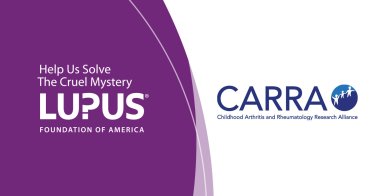CDC Awards More Than $4 Million To Support Childhood Lupus Research
Lupus Advocacy Efforts Drive Research Funding for the CARRA Registry
The Childhood Arthritis and Rheumatology Research Alliance (CARRA) announced that the U.S. Centers for Disease Control and Prevention (CDC) awarded a 5-year $4.4 million grant to a team of North American lupus experts to advance critical research on childhood lupus through the CARRA Registry.

The CARRA Registry was the first pediatric lupus registry funded by the CDC in 2019, resulting from nationwide rallying by lupus advocates for increased research funding to study the impact of lupus on children. Prior public funding of childhood lupus research was scarce.
Lupus in children and teens usually occurs more aggressively and severely compared to adults. The disease can devastate a child’s growth and day-to-day life, and even shorten a child’s life.
“The Lupus Foundation of America strongly advocates for increased research funding so that targeted treatments for children with lupus are developed and help to improve the quality of their lives,” said Patrick Wildman, Senior Vice President, advocacy and government relations, Lupus Foundation of America (LFA). “Lupus advocates have been instrumental in sharing the critical need for childhood lupus research with our nation’s leaders. We are grateful for their efforts and for the government’s support of this research need.”
New Funding Aims to Close Gaps in Pediatric Lupus Knowledge
The CARRA Registry exists as the largest, multi-center observational cohort study in North America following children and young adults with lupus, including more than 1,000 participants with physician-confirmed lupus. Continued funding for the Registry will allow researchers to build on an earlier phase of the CDC grant in which researchers expanded the Registry’s enrollment and comprehensive data collection. In that first phase, researchers began studying the natural history and disease trajectories of children with lupus, sociodemographic and disease characteristics, disparities in care and outcomes, and medication adherence.
Principal Investigators Drs. Aimee Hersh (University of Utah Health), Andrea Knight (The Hospital for Sick Children, Toronto), and Mary Beth Son (Boston Children’s Hospital) will continue to lead groundbreaking research in the next phase of the grant to address key gaps in lupus knowledge. The CARRA Registry also aims to follow all participants longitudinally for at least 10 years.
“We are thrilled to receive this second round of funding from the CDC to further our mission of advancing meaningful research in pediatric lupus,” said Aimee Hersh, MD. “This grant will use CARRA Registry data to help us better understand the long-term relationship between treatments and lupus disease activity starting in childhood.
“We are also interested in characterizing neuropsychiatric lupus and patient-centered outcomes important for improving quality of life and reducing disability, both of which are poorly understood in children and young adults with lupus,” Dr. Hersh continued. “What’s more, we plan to explore disease outcomes in early adulthood once young adults transition from pediatric to adult care.”
Lupus Foundation of America Leads in Child Lupus Research Funding Advocacy
Lupus advocates nationwide played a key role in securing the funding that made the grant possible. Advocates, including people with lupus and their families, researchers, and advocacy organizations, worked with the U.S. Congress to increase funding for the National Lupus Registry Program through CDC and to recommend that the program increase its focus on childhood lupus. The Lupus Foundation of America led the charge to establish this program in 2003 and continues to work with the federal government and advocates to expand appropriations for all agencies involved in lupus as part of its comprehensive research strategy.
Between 10 and 20 percent of all cases of lupus develop during childhood. Two out of three children or teens with lupus develop kidney disease, which can cause permanent damage and can be fatal. Lupus also can adversely affect a child’s growth, quality of life, as well as longevity.
CARRA researchers strongly expressed their appreciation of the LFA’s partnership and advocacy efforts that made this grant possible.
Check out videos from the lead investigators, including from Dr. Mary Beth Son who shares about the important role advocacy played in securing this grant and other funding for childhood lupus research - view videos here.
About Childhood Arthritis and Rheumatology Research Alliance (CARRA)
Formed in 2002, CARRA's mission is to conduct collaborative research to prevent, treat, and cure pediatric rheumatic diseases. CARRA is a 501(c)3 registered non-profit organization. For more information, please visit https://carragroup.org/.
About the Lupus Foundation of America (LFA)
The Lupus Foundation of America works to improve the quality of life for all people affected by lupus through programs of research, education, support and advocacy. In 2006, the Lupus Foundation of America established the first and only national childhood lupus research program, The Michael Jon Barlin Pediatric Lupus Research Program. The program supports discoveries in childhood lupus research and has funded important studies to develop better ways to treat and manage lupus in children and teens. For more information, please visit lupus.org.



